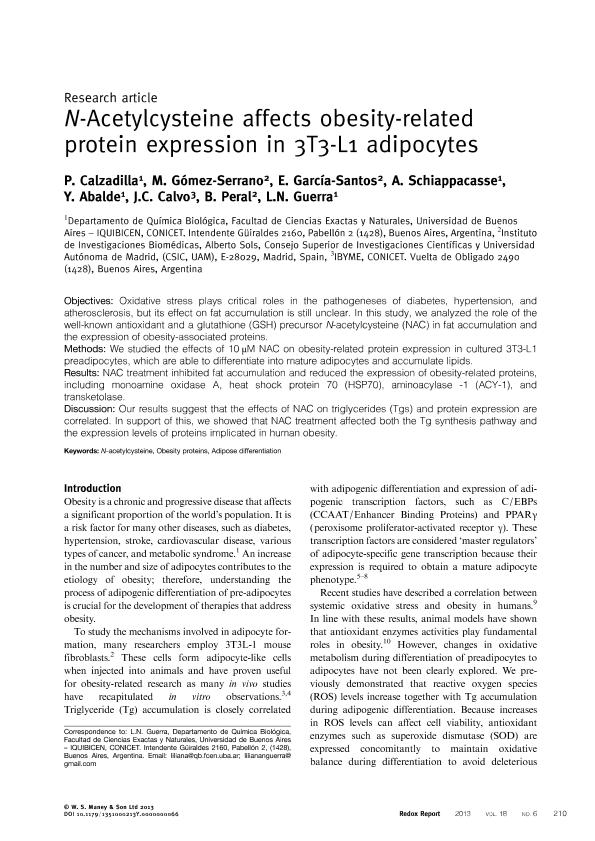Artículo
N-Acetylcysteine affects obesity-related protein expression in 3T3-L1 adipocytes
Calzadilla, Pablo Ignacio; Gómez Serrano, M.; Garcìa Santos, E.; Schiappacasse, Agustina; Abalde, Yasmin; Calvo, Juan Carlos ; Peral, B.; Guerra, Liliana Noemi
; Peral, B.; Guerra, Liliana Noemi
 ; Peral, B.; Guerra, Liliana Noemi
; Peral, B.; Guerra, Liliana Noemi
Fecha de publicación:
15/11/2013
Editorial:
Maney Publishing
Revista:
Redox Report
ISSN:
1351-0002
e-ISSN:
1743-2928
Idioma:
Inglés
Tipo de recurso:
Artículo publicado
Clasificación temática:
Resumen
Objectives: Oxidative stress plays critical roles in the pathogeneses of diabetes, hypertension, and atherosclerosis, but its effect on fat accumulation is still unclear. In this study, we analyzed the role of the well-known antioxidant and a glutathione (GSH) precursor N-acetylcysteine (NAC) in fat accumulation and the expression of obesity-associated proteins. Methods: We studied the effects of 10 μM NAC on obesity-related protein expression in cultured 3T3-L1 preadipocytes, which are able to differentiate into mature adipocytes and accumulate lipids. Results: NAC treatment inhibited fat accumulation and reduced the expression of obesity-related proteins, including monoamine oxidase A, heat shock protein 70 (HSP70), aminoacylase -1 (ACY-1), and transketolase. Discussion: Our results suggest that the effects of NAC on triglycerides (Tgs) and protein expression are correlated. In support of this, we showed that NAC treatment affected both the Tg synthesis pathway and the expression levels of proteins implicated in human obesity.
Palabras clave:
Adipocytes
,
3t3-L1
,
Redox
,
Differentiation
Archivos asociados
Licencia
Identificadores
Colecciones
Articulos(IBYME)
Articulos de INST.DE BIOLOGIA Y MEDICINA EXPERIMENTAL (I)
Articulos de INST.DE BIOLOGIA Y MEDICINA EXPERIMENTAL (I)
Articulos(IQUIBICEN)
Articulos de INSTITUTO DE QUIMICA BIOLOGICA DE LA FACULTAD DE CS. EXACTAS Y NATURALES
Articulos de INSTITUTO DE QUIMICA BIOLOGICA DE LA FACULTAD DE CS. EXACTAS Y NATURALES
Citación
Calzadilla, Pablo Ignacio; Gómez Serrano, M.; Garcìa Santos, E.; Schiappacasse, Agustina; Abalde, Yasmin; et al.; N-Acetylcysteine affects obesity-related protein expression in 3T3-L1 adipocytes; Maney Publishing; Redox Report; 18; 6; 15-11-2013; 210-218
Compartir
Altmétricas



